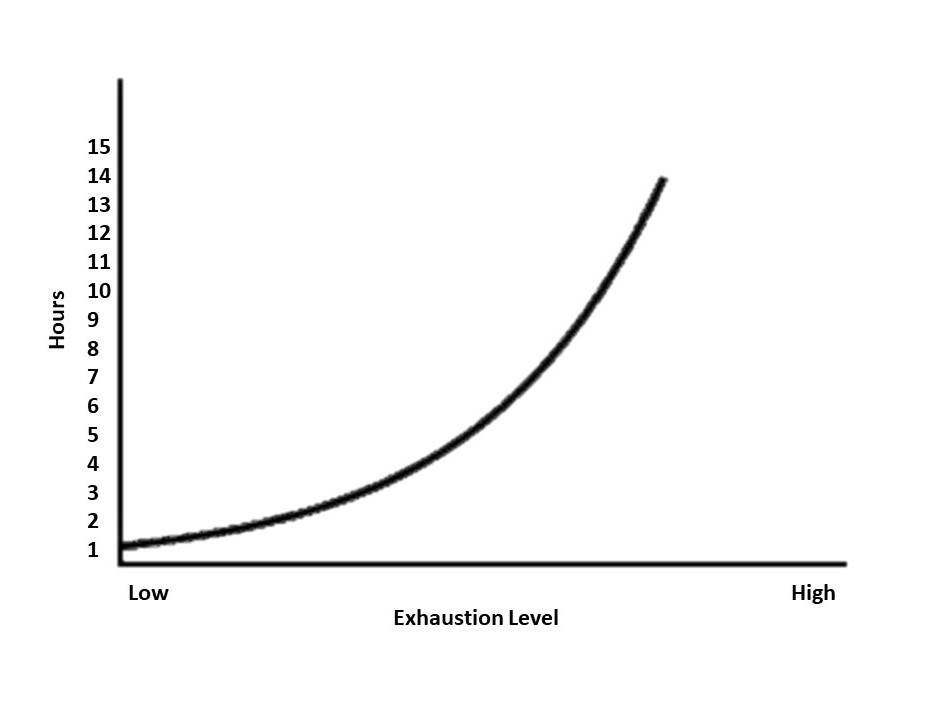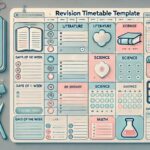How Many Hours a Day Should You Revise for A-levels?
Studying for your A-levels? It’s like preparing for a marathon, not a sprint. You’re juggling textbooks, notes, and maybe a bit of stress (okay, maybe more than a bit). And here’s the million-pound question – how many hours of revision a day for A levels? If you’re expecting a one-size-fits-all answer, well, it’s a bit more complicated than that. The truth is, it depends.
Ready to transform how to revise for exams from a question into an action plan? Let’s get started!
How Many Hours of Revision is Optimal for You When Studying For A-levels?
Here’s the thing: when it comes to A-level revision, there’s no one-size-fits-all strategy. It’s about as personal as your morning coffee order. Some folks might thrive on a solid 7-hour stretch, while others might find that 3 hours is their sweet spot before their brain starts to feel like mush.
How Much Revision is too Much?
Understanding the relationship between study time and exhaustion is key when planning your A-level revision. It’s a delicate dance – push too hard and you risk burning out; lean too easy and you might not cover all the bases.

Your study hours are on the y-axis and your level of exhaustion is on the x-axis. Initially, you might see a gentle climb – more hours, more tiredness, but it’s manageable. This is your productivity zone, where the hours you put in are translating into real, tangible learning.
So, how do you figure out your Goldilocks zone for revision hours? It’s pivotal to recognise that every student is as unique as a fingerprint. We’ve all got our own mental make-up, and what sends your mate into a study frenzy might just send you into snooze mode. To nail that revision timetable, a good, hard look in the mirror is in order. Are you the early bird catching the proverbial worm or the night owl soaring through silent evenings? Does the Pomodoro technique keep you ticking like clockwork, or are you more of a marathon runner, pacing yourself for the long haul?
Which Subjects Need the Most Work?
💡 Here’s a pro tip: carve out some time to jot down your strengths and weaknesses. Are you a whiz with words but a bit wobbly with numbers? Do flashcards make your memory jump for joy, or do you find flowcharts flow better for you? This isn’t just busywork – it’s about crafting a revision strategy that fits you like a glove.
| Subject | Strengths | Weaknesses | Revision Technique to Try | Hours per Week |
| Mathematics | Problem-solving | Theorems | Practice Problems | 3-5 |
| English Literature | Analytical reading | Essay writing | Peer Review Essays | 2-4 |
| Physics | Practical experiments | Conceptual questions | Discussion Groups | 4-6 |
| History | Historical dates | Critical analysis | Documentary Analysis | 1-3 |
| Biology | Lab work | Genetics | Flashcards | 3-5 |
| Foreign Language | Pronunciation | Grammar | Language Apps | 2-4 |
Once you’ve got your list, use it to guide your study sessions. Play to your strengths to build confidence and tackle your weaknesses in bite-sized chunks to avoid overwhelm. By aligning your revision hours with when and how you learn best, you’re not just putting in time – you’re putting in smart time.
How much revision is too much? Yes, that’s a thing. Cramming every waking moment with study can lead to burnout, and no one wants that. It’s about finding balance, using revision strategies that play to your strengths, and giving yourself a break now and then (because hey, you’re human).
A-levels can be tough cookies to crack, so let’s not make it harder by sticking to rigid revision myths. Whether it’s a smart revise session or a more laid-back approach, the best way to revise is the one that lets you hit the books feeling fresh and keeps procrastination at bay.
How to Manage Revision for A-levels?
Alright, let’s talk about managing your A-level revision without turning into a zombie by exam season. You’ve got subjects stacked up like pancakes and a syllabus longer than a weekend Netflix binge. The key? A killer revision timetable.
Think of your revision timetable as your personal road map. It’s there to guide you, not to dictate every pit stop and scenic route. Start with the big picture – which subjects need the most work? Where are those gaps in knowledge that need filling? Once you’ve got that down, you can break it into manageable chunks. Remember, even the best revision techniques won’t save you if you’re running on empty.
Monday
| Subject | Revision Hours | Technique | Breaks |
| Mathematics | 2 | Pomodoro | 15 mins every hour |
| English Literature | 1,5 | Focused Study | None |
| Physics | 2 | Pomodoro | 15 mins every hour |
| History | 1 | Focused Study | None |
| Biology | 1,5 | Focused Study | None |
Tuesday
| Subject | Revision Hours | Technique | Breaks |
| Mathematics | 2 | Pomodoro | 15 mins every hour |
| English Literature | 1,5 | Focused Study | None |
| Physics | 2 | Pomodoro | 15 mins every hour |
| History | 1 | Focused Study | None |
| Biology | 1,5 | Focused Study | None |
Wednesday
| Subject | Revision Hours | Technique | Breaks |
| Mathematics | 2 | Pomodoro | 15 mins every hour |
| English Literature | 1,5 | Focused Study | None |
| Physics | 2 | Pomodoro | 15 mins every hour |
| History | 1 | Focused Study | None |
| Biology | 1,5 | Focused Study | None |
Thursday
| Subject | Revision Hours | Technique | Breaks |
| Mathematics | 2 | Pomodoro | 15 mins every hour |
| English Literature | 1,5 | Focused Study | None |
| Physics | 2 | Pomodoro | 15 mins every hour |
| History | 1 | Focused Study | None |
| Biology | 1,5 | Focused Study | None |
Friday
| Subject | Revision Hours | Technique | Breaks |
| Mathematics | 2 | Pomodoro | 15 mins every hour |
| English Literature | 1,5 | Focused Study | None |
| Physics | 2 | Pomodoro | 15 mins every hour |
| History | 1 | Focused Study | None |
| Biology | 1,5 | Focused Study | None |
Saturday
| Subject | Revision Hours | Technique | Breaks |
| Mathematics | 2 | Pomodoro | 15 mins every hour |
| English Literature | 1,5 | Focused Study | None |
| Physics | 2 | Pomodoro | 15 mins every hour |
| History | 1 | Focused Study | None |
| Biology | 1,5 | Focused Study | None |
Sunday
| Subject | Revision Hours | Technique | Breaks |
| Mathematics | 2 | Pomodoro | 15 mins every hour |
| English Literature | 1,5 | Focused Study | None |
| Physics | 2 | Pomodoro | 15 mins every hour |
| History | 1 | Focused Study | None |
| Biology | 1,5 | Focused Study | None |
And hey, let’s talk about revision methods. Are you into the classic read-write-recite? Maybe you’re all about that smart revised life, mixing it up with apps and online resources. Or perhaps the Pomodoro technique – that’s working in short bursts with breaks – keeps your brain buzzing and procrastination at bay. The best revision strategies are the ones that keep you engaged without edging into overkill territory. Because let’s be real, how much revision is too much? When you can no longer remember your own name, you’ve gone too far.
So, how to revise effectively? Mix it up. Use different revision techniques to keep things fresh. Plan your days with a mix of subjects to avoid monotony. And most importantly, balance those revision hours with your life hours. You know, the ones where you actually relax and do stuff you enjoy.
How Hard is it to Revise for A-levels?
what makes A-levels a formidable foe and how you can arm yourself with the best strategies to tackle them head-on. Whether you’re a seasoned pro at hitting the books or the thought of revision makes you want to run for the hills, we’ve got some truths to share and myths to bust. So, let’s get down to business and answer the burning question: How hard is it to revise for A-levels, really?
By using the subject-specific revision tips, that are shared below, you’re setting yourself up for a smoother ride. Think of these strategies as your secret weapon, your toolkit for turning a tough slog into a manageable – dare we say, enjoyable – journey. With these tricks up your sleeve, you might just find that revising for A-levels is the easiest thing you do all year. Go on, give them a try and watch the ‘hard’ in ‘hard work’ disappear.
Mathematics
It’s all about problem-solving, right? So, grab those past papers and get cracking. Dedicate a chunk of your revision timetable to working through problems. If the Pomodoro technique sounds like your jam, use it to break down study sessions into focused bursts. And remember, if you get stuck, don’t stew – review the solutions to understand where you went wrong.
English Literature
For the budding Shakespeares, it’s essay time. Try peer review sessions to sharpen your analytical skills. Discuss themes, motifs, and character arcs with classmates to gain different perspectives. And when you’re revising for the theory test, a smart revise tactic is to relate themes to modern-day scenarios – it sticks like superglue.
Sciences (Physics, Chemistry, Biology)
These subjects might seem like mountains to scale, but with the right tools, they’re more like hills. Alongside flashcards for those tricky definitions and sketching out processes and cycles, another ace up your sleeve is diving into past papers. They’re not just a test of knowledge; they’re a window into the exam’s soul, showing you the patterns, the recurring themes, and the way questions are framed.
History
It’s story time, but with dates and facts. Create a timeline of events to visualise the sequence. For deeper understanding, tackle a few critical analysis essays to solidify your arguments. And a hot tip: documentaries can be a great way to revise, giving you the narrative with all the visual bells and whistles.
Languages
Roll with the punches of pronunciation and grammar by mixing up your revision strategies. Language apps can be a game-changer for interactive learning and speaking practice. And don’t underestimate the power of listening to songs or podcasts in the language you’re learning. It’s revision that doesn’t feel like revision.
| Subject | Key Focus | Suggested Techniques | Revision Tips |
| Mathematics | Problem-solving | Past papers, Solutions Review, Focused Bursts with Pomodoro Technique | Understand your mistakes, don't just memorise solutions |
| English Literature | Essay writing and analysis | Peer Review Essays, Thematic Discussions, Relate Themes to Current Scenarios | Discuss with peers for diverse insights, practice makes perfect |
| Sciences | Definitions, processes, experiments | Flashcards for Terms, Drawing Diagrams, At-home Experiments, Study Groups | Active recall with flashcards, make your study hands-on |
| History | Critical analysis and timelines | Timelines for Events, Critical Essays, Watching Documentaries | Visualise history to remember, engage with the content beyond books |
| Languages | Pronunciation and grammar | Language Apps, Listening to Music/Podcasts, Speaking Practice | Immerse yourself in the language, use it in daily life |
Try Online Tutors to Revise for A-levels
As you’re plotting out your revision strategy, it’s worth considering all the resources at your disposal. Sure, there’s a plethora of revision tips and techniques out there, but sometimes, a guiding hand can make all the difference in navigating the A-level landscape.
This is where tapping into the expertise of those who’ve triumphantly navigated this journey before can be invaluable. Imagine having a mentor, someone from the very universities you’re aspiring to attend, who can provide tailored guidance. It’s about complementing your self-study with insights from those who know the drill inside out.
Platforms like Edumentors can offer you this personalised support, pairing you with mentors who are well-versed in the very subjects you’re tackling. They’re not just savvy in academic theory but also in the art of exam technique – a crucial element that often makes all the difference.
So, while you’re carving out those hours for revision, remember that it’s not just about quantity. The quality of your study, the smart revision, the strategic approach – these are what transform hard work into smart work. And sometimes, a bit of tailored, one-to-one guidance is just the catalyst you need.
General Tips
No matter the subject, the best way to revise is to keep it varied. The brain loves variety, so switch between revision methods to keep things fresh. And always, always keep an eye on the clock – how many hours of revision a day is healthy? You need balance. Too much of a good thing, including revision, can tip you over into burnout territory.
Remember, A-levels is about pacing yourself and knowing when to power through and when to power down. Finding that balance between study and rest is the true art of A-level revision, and it’s different for everyone. So, whether you need more hours of revision or just a few focused sessions, make them count, and don’t let procrastination steal your thunder.
Conclusion
revising for A-levels is a personal adventure. You’re the captain of your ship, steering through the sea of study leave, revision timetables, and exam prep. Some of you may cruise comfortably with a steady 3-hour daily revision session, while others may opt for a full-on 7-hour deep dive. The key is to listen to your own rhythm, to understand when smart revision tactics are needed, and to know when to press pause with a technique like Pomodoro to avoid burnout.
As you tailor your revision strategies, remember that the best way to revise is the way that works for you. Whether it’s mastering revision techniques, figuring out the best revision methods, or simply trying to conquer procrastination, it’s all part of the process. And if you feel you’re hitting a wall or need to fill in some serious gaps in knowledge, remember, help is just a click away. Edumentors offers personalised, A-level tutors – at the threshold of success. So go ahead, give them a go, and march confidently towards your exams. Good luck, and may your A-levels be nothing but a testament to your hard work and unique abilities.








